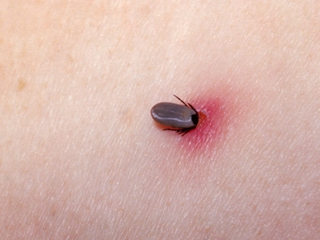Insects are around us all the time, especially in summer. For the most part, we co-exist with them with no problems. But sometimes, we may get in their way and they will give us a bite which will make us miserable: painful itching, swelling and redness. This is when we need to know how to treat bug bites. Swelling is not always a big issue, but if it continues for more than 3 to 4 days or the bites get infected, you should seek medical help. Otherwise, you can try these helpful home remedies for initial bug bite treatment which will effectively save you the agony of bites.

How to Treat Bug Bites
Remove the Stinger or the Bug
If you have been bitten or stung, try to get the stinger or the bug out as soon as possible. Scrape with your nail or something hard. Don’t push on the venom sac if there is one. Do not pinch with tweezers or fingers because you may further inject venom into the skin. Don’t allow kids to remove a stinger themselves.
If you have been bitten by a tick, use a pair of tweezers that have been cleaned with alcohol. Grab the bug as close to your skin as possible and pull the tick out carefully, making sure that you get them out all of the head and mouth. Use care not to squish the body of the bug as you remove it because its blood and saliva may be infected into the wound, which may increase the risk of disease. Use rubbing alcohol to kill the bug. Remember to wash your hands with soap afterwards.
Clean the Bite Area
As soon as you are bit, wash the affected area right away. Use an antibacterial soap and warm water. You can also use soap and cold water. This will help lower the chance of the bite becoming infected.
Apply an Ice Compress
After removing any stinger or bug from your skin and washing, apply an ice compress. Make sure you wrap the ice pack in a towel or cloth to protect your skin. This will help with itching and swelling to the area. Ice can also slow the absorption of venom into the bloodstream.
Use Medications
The following over-the-counter medications can help relieve the symptoms of itching, pain and swelling.
Antihistamines
Antihistamines that contain diphenhydramine (Benadryl), chlorpheniramine maleate (Chlor-Trimeton) can relieve the reaction and reduce itching and swelling to the area.
Pain medications
Acetaminophen (Tylenol) or ibuprofen (Advil, Motrin) can help relieve pain from bug bites. Ibuprofen can also help reduce swelling to the area. Aspirin should not be given to children. Adults can take an aspirin and use it moistened directly to the wound to ease the itchiness and swelling.
Topical creams and sprays
Use topical creams and sprays that contain hydrocortisone (1%), calamine lotion, lidocaine, colloidal oatmeal or pramoxine can help with itching and inflammation. They can be applied directly to the area for relief.
Note: If you experience severe symptoms, see your doctor immediately. They can prescribe strength steroids to treat bug bites.
Protect the Blisters
Protect any blisters that appear as the result of a bite. Popping them can cause an infection to the area. Blisters should not be painful unless you pop them and expose the raw skin. Just cover them with a bandage until they heal.
Use Some Remedies
If you are wondering how to treat bug bites without medication, here are some home remedies that are all-natural and safe:
Banana
This remedy is great and very safe for kids, but even grown-ups can use it. Take a banana and peel it. Rub the inside of the banana skin directly on the bite. It stops itching right away and reduces swelling and chances of scarring.
Baking soda
Baking soda is great to relieve bite and sting discomforts. Take some baking soda and add just a few drops of water to make a paste. Apply it to the area and allow to dry. This can reduce the chance of scarring, reduce swelling, itching and pain. Leave the paste on for a little while and then rinse with cool water and pat dry.
Kosher salt
Kosher salt or even sea salt can help minimize swelling and chances of infection. Rub the area with the salt and wait a few minutes. Then rinse with cool water.
What to Do If Bug Bites Cause Severe Reactions
Seek Medical Help Immediately
If you or someone you know is having a severe reaction to a bug bite or sting, complications can happen very quickly. If you notice any of the following, call 911 right away:
Trouble breathing
Fast heart rate
Facial, throat or lip swelling
Hives
Feeling faint
Feeling dizzy
Confusion
Nausea and vomiting
Muscle cramping
Take Some Measures
While you are waiting for emergency services to arrive, do the following:
See if there is an “EpiPen”. If people have a known allergy to bites, they will have an epinephrine injector. Take the pen and hold it to the thigh area and inject. Massage the medication into the muscle to get it in quickly.
Loosen clothing. Loosen any clothing that is restrictive. If you have one, cover the person with a blanket or towel.
Do not allow the person to eat or drink. The reaction could cause vomiting and he or she may choke if unconscious.
Make the person lie on a side. This will prevent from choking if he or she vomits or begins to bleed out of mouth.
Start CPR. If the person passes out and have no signs of breathing or pulse, begin CPR immediately.
Note: If you or someone in your family has an allergy to a bug bite or sting and they have an “epi-pen”, make sure everyone knows how to use the pen.

View All Comments /Add Comment